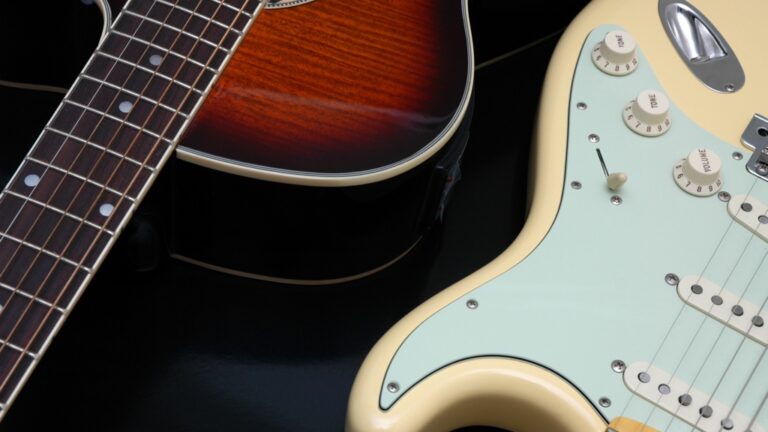Table of Contents
So you want to start learning guitar but you are unsure whether to start in an acoustic or electric – you have come to the right place!
In this article, we will go over the advantages and disadvantages of learning guitar both on an acoustic or electric guitar, providing you with a detailed explanation as to what is the best for you.
Advantages of learning guitar on an acoustic vs electric
Advantages:
- Develop stronger “guitar calluses”
- Get a better grip on the strings
- Improves your fingers and hand strength faster
- You can easily play any kind of guitar
- Improved articulation and picking
Disadvantages
- It will be more painful
- It can be demoralizing
- Requires a lot of dedication
- It can take more time
- Acoustic guitars are bulkier
Advantages
Guitar calluses
An acoustic guitar uses heavy steel strings that require more strength to press. Acoustic guitars also use higher gauge strings, which means they are thicker than electric guitars.
This ends up developing your guitar calluses faster, although it will be more painful in the beginning.
Better grip on the strings
Since you have to use more strength to press your guitar strings, this develops your grip on the string faster. It may save you repetitive exercises on the electric guitar since the strings are thinner.
Finger and hand strength faster
Obviously, the acoustic guitar forces you to develop stronger fingers and hands, which will make it easy for you to play any type of guitar.
Easy to play any type of guitar
An acoustic guitar has by far the thickest strings, and if you start learning on them it will be easier to move on to other guitars like electric, acoustic-electric, or even classical guitar.
Articulation and picking
Since you develop stronger hands and fingers, your articulation and picking will be greatly improved. This is another great advantage of starting out on an acoustic guitar.
Disadvantages
More painful
You have to be prepared because learning on an acoustic guitar will be far more painful than learning on an electric one.
The reason is that most electric guitars use light gauge strings, which means that they tend to be thinner. In turn, this forces you to apply a lot more strength when putting pressure on the frets.
The first month should be a little painful, but once you get your guitar calluses going, it will become easier.
It can be demoralizing
Due to the pain, and the fact that it will be difficult to practice for long periods of time, you might lose your motivation. It can be demoralizing, because the progress will be slow, and it will require a lot of dedication. Remember to not give up, and keep practicing.
Dedication
One of the reasons not everyone plays guitar is that it requires a lot of dedication to be able to overcome the first months of learning. You need to practice on a weekly basis, and the pain and the slow progress can put your dedication to the test.
It takes more time
Since it is more painful to start on an acoustic guitar it might take you more time. Sometimes you really have to take a break because the pain will be unbearable. This slows down your development, and it is one of the reasons why some players prefer electric guitar.
Acoustic guitars are bulkier
Lastly, acoustic guitars are bulkier than electric guitars. For this reason, it takes a while to get used to the shape and the position of your hands, while an electric guitar is thinner and more comfortable to play.
Do I need to learn acoustic guitar before electric?
No, you do not need to learn an acoustic guitar before you start playing an electric guitar. There are advantages and disadvantages to both but once you learn how to play the guitar you will always be able to play both acoustic and electric. Even if you have to adapt slightly to the instrument, and also adapt your playing.
Can I learn electric guitar before acoustic?
Yes, if you are more into electric guitar then by all means start learning on one. The main disadvantage, when compared with learning on an acoustic, is that it will be more difficult to make the transition to acoustic since you are used to lighter gauge strings.
You may also start learning electric guitar by setting it up with heavier gauge strings that resemble an acoustic guitar. Like 11 or 12 gauge strings. This will make it easier to make the transition, while also forcing you to develop stronger fingers and hands.
Is it easier to learn guitar on an acoustic or electric?
Overall it is easier to learn on an electric guitar, since the strings are lighter, and require less strength to press. It is also less painful, which allows you to practice for a longer time.
Remember that an electric guitar will also require you to have an amp and a guitar cable.
Should you start learning on an acoustic or electric?
Most guitar players tend to start learning on an acoustic because the strings are heavier and it forces you to develop finger strength and articulation faster. Additionally, an acoustic guitar will force your finger to develop very strong “guitar calluses”, that allow you to play longer.
You may still want to start on an electric guitar, and there is nothing wrong with it. However, you should be aware that it will be more difficult for you to make the transition to acoustic if you wish to do so.
You may also want to start learning on a classical guitar, which has nylon strings that tend to be softer. Pressing nylon strings will still be harder than on an electric guitar but it might be a good compromise.
Remember however those classical guitars have a very distinctive sound that has nothing to do with what we hear in most mainstream music. This is one of the disadvantages as the tone of the instrument might not be your cup of tea.
Conclusion
Choose a guitar that excites you, and motivates you to start learning and practicing every day. The first few weeks of playing can be painful, and unless you really enjoy your instrument you might give it up altogether.
Having a guitar that gets you excited about learning how to play is the most important thing.

I have been playing guitar for the past 15 years, and my knowledge and passion for guitars prompted me to start Guitaresque to share my knowledge, tips, and tricks with other guitar players. The sole purpose of this website is to help and inspire guitar players worldwide, to improve their playing and their love for guitars.








![Can You Learn Guitar in a Year? [Explained]](https://guitaresque.com/wp-content/uploads/2022/04/yogendra-singh-whkykS2jENA-unsplash-600x400.jpg)
![How To Take Care of Your Hands To Play Guitar [9 Tips]](https://guitaresque.com/wp-content/uploads/2023/01/Depositphotos_72821727_S-600x400.jpg)